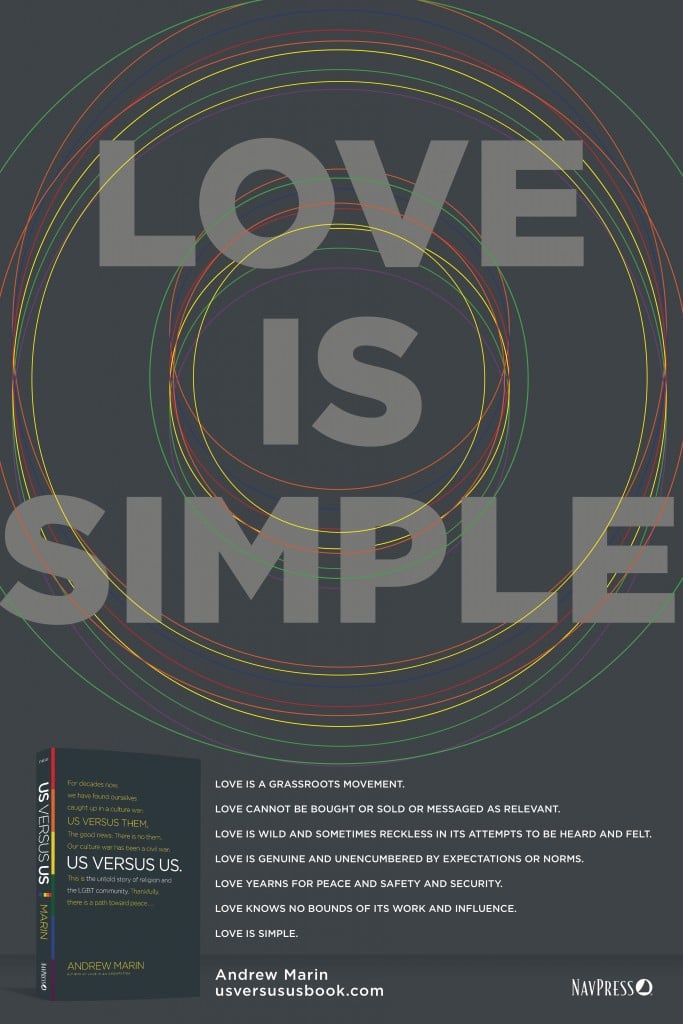 The following post is by Ian Brown, student at Moody Bible Institute, and a summer intern with The Marin Foundation.
The following post is by Ian Brown, student at Moody Bible Institute, and a summer intern with The Marin Foundation.
I’m the type of person who has a lot to say. I have an opinion on most subjects even if I haven’t thought much about them. I’m normally the first to speak up in a group or step forward to let my opinion be heard. In other words, I struggle with listening. As an intern at The Marin Foundation, part of the job is listening and not asserting one’s opinion. It’s taken some getting used to.
I participated in the “I’m Sorry” Campaign at Chicago’s Gay Pride Parade this year, publicly apologizing as a Christian for the way the Church has persecuted the LGBTQ community. In preparation for the campaign, all I could do was think of the things I’d need to say in order to make a difference. When I got there, I quickly realized nobody wanted to stop and listen to me explain at lengths about why I was there. People were there to celebrate! And we had a sign that did most of the explaining for me! It took some effort, but I began to celebrate with people and relax about not speaking to everyone. When a conversation did start, I just asked questions. It was then I decided I like listening and I wanted to work on becoming a good listener.
Becoming a listener is a lot harder than it sounds for someone like me. I tried just shutting up for a while and that helped, but it certainly didn’t fix much. I needed a plan; a set of guidelines to go by when I was talking to people. So I came up with these four tangible practices:
1. Wait.
If I’m on a break with one of my coworkers and they start venting to me about a customer, I should wait for them to finish what they’re saying before I respond. Not just wait until I think their sentence is finished, but wait 5 seconds to think about my response.
2. Ask questions.
If one of my roommates says something about their day, I should not only listen, but ask follow-up questions and show my investment. I want the person I’m talking with to feel cared about and not try to hide a detail he or she thinks I might not care to hear.
3. Don’t try to relate when you can’t.
If I’m talking to some in the LGBTQ community about, say, the harm they may have experienced from the church they grew up in, I shouldn’t talk about how my friend went through that too. The conversation isn’t about my friend; it’s about the person I’m speaking with.
4. Be curious.
If I’m out to coffee with a friend I met through The Marin Foundation, and they tell me about the changes occurring in the LGBTQ community, I should be genuinely interested in what they’re saying. Instead of waiting for the perfect time to say what I think, I should want to learn more. Being interested can mean thanking them for sharing and echoing what they had to say. I want people to know that I appreciate whatever it is they told me.
As soon as I started doing these things, I started learning more about my friends. I started accepting people for who they are. I also started learning a lot more about issues that I care about. While these four guidelines have become a good habit, they still are not quite second nature. My natural inclination is to be selfish conversationally, and for that reason this will be a life-long discipline.
One final note: The practice of listening is certainly important with friends and those I see eye-to-eye with. It’s arguably more important to listen well to those who I disagree with. Without really listening to people with opposing viewpoints, I cannot really learn about any issue. Whether it’s for the sake of being well-informed or being respectful, being an honest listener should transcend differences in opinion.












